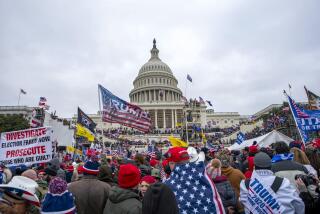Conservative justices hint at procedural barrier to DOMA ruling
WASHINGTON -- Two of the Supreme Court’s most conservative members suggested Wednesday that procedural barriers should prevent the justices from ruling on the constitutionality of the federal law that denies benefits to legally married same-sex couples, but a majority of the justices seemed inclined to push past those issues.
Edith Windsor, an 83-year-old widow from New York, challenged the 1996 federal marriage act after her wife, Thea Clara Spyer, died in 2009. The two were legally married in 2007, and New York recognizes same-sex marriages. But because DOMA bars recognition of their marriage by the federal government, the IRS said Windsor owed $360,000 in taxes on property she inherited from Spyer. An opposite-sex couple would be exempt from the tax bill.
FULL COVERAGE: Battle over gay marriage
Windsor sued, won in federal district court and again in the U.S. 2nd Circuit Court of Appeals. The courts ruled that by treating Windsor and Spyer differently from other legally married couples, the federal law violates Windsor’s constitutional right to equal treatment.
The Obama administration decided in 2011 that it, too, believes the law violates the Constitution. But President Obama said the administration would continue to enforce the statute until the Supreme Court could rule on it, so the IRS has continued to say that Windsor owes the money.
The administration’s refusal to defend the law while still asking the high court to rule on it prompted hostile comments from two of the court’s conservative members.
“I don’t see why he doesn’t have the courage of his convictions,” Chief Justice John G. Roberts Jr. said, suggesting that if Obama disapproves of the law, he should simply refuse to enforce it rather than asking the court for a decision.
PHOTOS: Supreme Court considers gay marriage
Justice Antonin Scalia similarly chided a lawyer for the administration, saying that when he worked in the Justice Department the government’s clear policy was to defend all federal statutes except those which clearly infringed on the president’s constitutional powers. “I’m wondering if we’re living in this new world” in which presidents and attorneys general will routinely refuse to enforce laws with which they disagree,” he said. If so, cases like this “will come all the time.”
Defending the administration, Deputy Solicitor General Sri Srinivasan said the president’s oath to defend the Constitution gives him the authority to refuse to defend a law that clearly violates a constitutional provision. But, he said, when the president makes that decision, it’s not an “all-or-nothing” situation that requires the government immediately to stop enforcing such a law.
The administration had decided to seek further court review of the law out of “respect” for the courts and Congress, Srinivasan said.
His position appeared to draw support from at least four of the justices. A majority of the court seemed willing to reach the merits of the case and appeared skeptical of the law’s constitutionality.
Gay marriage through the years
The procedural issues are important because federal courts will only decide cases if the parties have a genuine dispute and if each side has a clearly defined stake in the outcome. If the justices were to decide that the federal government and Windsor are, in effect, completely on the same side, they might not be in position to decide the case. In that situation, a lower court ruling which Windsor won would prevail, but the constitutional status of the law might remain in doubt.
When the case initially reached the high court, at least some of the justices indicated that they considered those procedural issues a potential bar to resolving the merits of the DOMA case: They set aside nearly an hour of argument solely to consider the issue, and they appointed a Harvard law professor to argue the position.
Paul D. Clement, the former solicitor general who represents the House Republican leadership in supporting the law, argued that the House has an independent authority to defend laws that Congress has passed if the executive branch declines to do so. Several justices expressed skepticism about that position, but the court may not resolve that issues.
Follow Politics Now on Twitter and Facebook
Twitter: @DavidLauter
More to Read
Get the L.A. Times Politics newsletter
Deeply reported insights into legislation, politics and policy from Sacramento, Washington and beyond. In your inbox three times per week.
You may occasionally receive promotional content from the Los Angeles Times.












